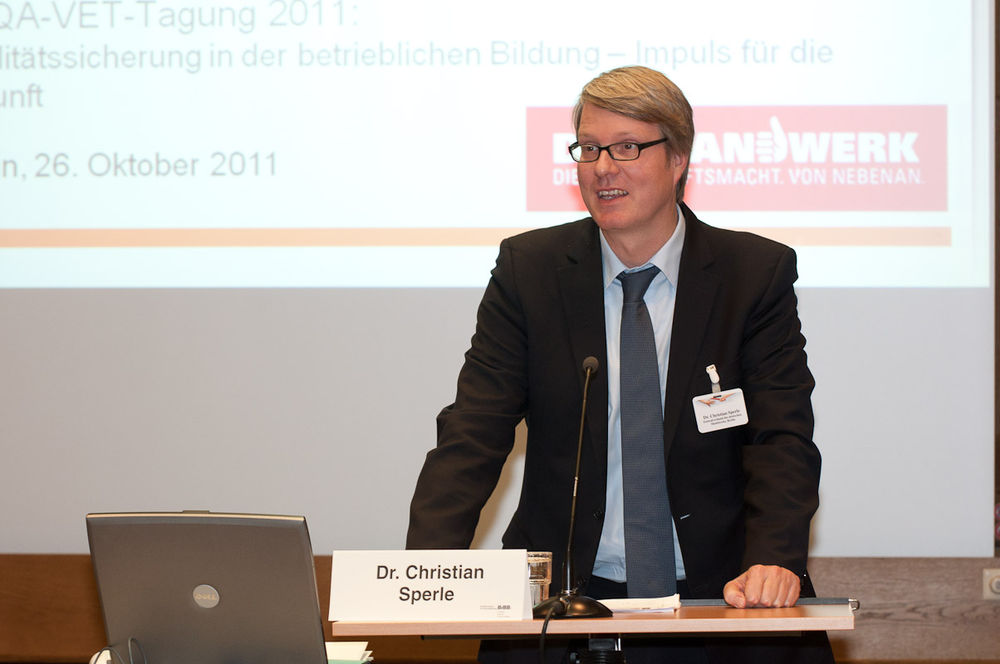 No mobility is suported in Germany for VET students, that's what Dr. Christian Sperle the Head of the Department for Vocational Training told in an interview.
No mobility is suported in Germany for VET students, that's what Dr. Christian Sperle the Head of the Department for Vocational Training told in an interview.
Some information about our organization: in German context. It’s the umbrella organization of the skilled craft sector. What is skilled craft? Different nations may have different interpretations, and understanding of the word. This is something defined by law. Some kind of fund which proficiency belongs to skill crafts (hair dresser, brick layer for ex. it is related to your job). We also have to differentiate, an automobile technician, who is responsible for maintenance working in the garage is skilled craft worker. However, the automobile technician working for VW for example is of course industry so it belongs to car production. It’s not so easy to differentiate. About 5 million people are working in the sector, 1 million companies, and a lot of small micro companies. 400.000 young people are having the apprenticeship there, is quite a high number. Apprenticeship training is a dual system training, typical German approach, can also be found in Austria, Denmark, Luxemburg company based plus school training. So skilled craft has 400.000 apprentices, which means that close to 8 percent of the workforce in a company are apprentices. The average number in Germany is 3 %. It’s really high, also because of high involvement of tradition in this sector. There are approximately 1.4 million apprentices in all sectors.
Our organization is covering whole Germany. As initial umbrella organization we are only representing this sector not representing industry, agriculture etc.
Our organization has two pillars, first pillar is chamber of crafts (there is also chambers for industry, lawyers, medicine etc.). In their regions they are competent institutions. They are also involved in transnational mobility, often they have people working there giving advice, guidance for apprentices, students, trainers from the companies, how to organize transnational mobility. Imagine I mentioned earlier the micro companies, usually their structure is one entrepreneur three people and one apprentice, they will never ever work out an application for LEONARDO, it’s too complicated. This was a bit my idea, I created this six years ago, when we want to push the topic of transnational mobility in to education, we need guidance structures, I always had the idea that it’s impossible without international offices.
We have national agencies with website and phone number, but you don’t have anybody in the region to help you, so we implemented this network. We called mobility coaches, they are at the chambers, these coaches also work out projects, are involved in Leonardo, they have context of other partners in other countries, one or two chambers at least also have relations to Hungary.
What is usually do is lobbying, I’m in the national board for Erasmus+ in Germany, my job is not writing applications, my job is to know if we have enough money. I’m not a professional of organizing and planning, implementing and evaluating mobility process I can show you we have infrastructural network.
This is called education without borders, you have the people there, coaches.
Orange means we have money from the ministry of social affairs, chambers can say okay, we have the 80 percent of the money, to finance the activities of that person. Grey means they are not in this program, they are also mobility coaches but they are paying for themselves, other funding. So we also have this coordination unit, this is good if you have direct interest for ex. okay I’m looking for a partner, I have twenty young electricians and they are really interested in mobility projects. How can I start?
It’s always good to contact first the initial coordination unit, there is one lady in Berlin, there is another one is Düsseldorf, you can make the first contact, I can give you the addresses, this is principle of our system, not only chambers of skilled craft, this is a cooperation, we are always working together. Cooperation of excellent level these coaches they work together, problem is funding runs out, it is really hard to get a future funding after 6 years, when this network will not be financed anymore by the federal government, then we have nothing, it is running out this year December.
Do you have any promises?
One of our major jobs, every second day at the ministry of economy and pushing them, otherwise we are working a lot with members of the parliament, so we are trying to make a lot of political pressure. All these networks costs less than 2 million Euros / year, it’s not nothing, but you know what sums are spends for silly things, 1.8 million a year for a structure like this is not much.
How many coaches do you have?
38-40, It’s on the webpage: http://www.mobilitaetscoach.de/
You have the person’s, address, email etc. The real treasure behind this webpage is the data base, edited, fed by the mobility coaches. Country specific information, also reporting experiences. Really practical information.
Do you know if (for the participants of mobility problems) are having intercultural trainings?
They are involved in trainings, and seminars but it really depends on the project itself. I heard in the new Leonardo Erasmus+ you don’t have any more preparatory language courses. You have some virtual language courses, but they are not yet implemented. I’m not sure if there is money in the future for intercultural preparation. However I know they are involved in the preparation, because it is a very important part, to avoid major problems later on.
When you are discussing with the ministry, and you are trying to convince them, what is your argument (how is Germany or the education system profiting from these mobility programs?)
A very simple argument is: Why do young people, who are at universities, get their services for free when young people in vocation education trainings don’t have this service. This is a very fundamental question. You can discuss this matter in the European union in all 28 countries, all the politicians, decision makers, all have been educated in universities, 95% of them at least. The focus is on kindergarten, high school, university, the rest doesn’t count. For this learning pathway, the major money which is there for education is reserved. This is something for low achievers, students who are demonstrating on the streets are not of the working class. This is not an argument, this is only a fact. Decision makers need to know that this is not fair, simply not fair. They can’t simply don’t have an explanation for it. The other thing is that, transnational mobility have added value, not only for young people but also for companies, for example: small micro companies 8-9 % who are offering their services across border. The point is we have much more companies who have the potential to do this, however they don’t because they don’t have a staff with intercultural competence, with foreign language proficiency.
For example 50-60km away is Poland. It’s a big market but it is not used (many skilled craft companies between, but rarely speaks Polish, or familiar with Polish customers needs and culture). The other way around is the same, but more polish people speaks German than German who speaks polish.
Talking about foreign students advantage with more languages, and how time spent abroad is a big value (on the labour market also, more interesting feature, many positive effect besides language proficiency). This is nothing country specific, more like provider (partner) specific.
And if we are not thinking of nationalities but more about field of jobs?
Yes, there is a relation, for example pastry cooks they are more used to going abroad. Car mechanics also, because you don’t have to use the language that much in the garage. Some problematic fields, retail for example, you really have to talk a lot. You really need the language to work with the customers.
What are the main languages in schools in Germany?
English, traditionally, only in the very west Germany they study French, border to Denmark they study Danish, it depends on geography, English is the most important, Spanish is very popular. I don’t think Hungarian is it’s very complicated.
All the Slavic languages are easy to learn, but people often hesitating, English is simply closer and easier to learn, Polish has great potential but it is not used.
And do you have any information about the mobility projects that are taking place in Germany (the incoming mobility projects)?
Yeah this is often of course related to the mobility coaches, they have partners in other countries, where mobility runs on bilateral ways, so I sent a group of young people, but you also have to host a group of young people sooner or later. This reciprocal element is typical. Related to high disoccupation rates (Greece, Spain for ex.), foreigners often ask for help with apprenticeship training in Germany. People, language and culture are completely different. Lots of companies offer placements who also takes young people from other European countries. It’s often that mobility coaches said to me that when you have convinced companies to participate in transnational mobility programs, they say okay, but first I want to host a young person from abroad, before I send someone from my apprentices then I can see how this works. It is interesting because normally you would think they would send someone away, then host someone. But it’s not true they often take this as a test.
Do you have other sources for the costs mobilities?
Traditionally German - French programme, heritage of the second WW, you have own programme between Germany and France, it’s a bigger one. But still nothing compared to the European funds.
And after the socialist times (eastern block)?
After the reunification, it was neglected.
Is there any mobility programme inside Germany (it is quite a huge country)?
No, but it would be a good idea. We have some mobility because we have regions which are quite poor, and we have boom regions, so young people usually travel to the good economy parts to start their apprenticeship but it is not within the frame of mobility programs. We used to have bigger movement but after 25 years it is starting to get smaller.
Okay, my last question is about, if you see other place of development in this mobility field. I mean now we are struggling for maintaining this coach network, but let’s say tomorrow you get the financial background what would be the next step to improve?
We have to be realistic. The potential of young people from vocational education training, concerning transnational mobility programs are not so high compared to university students. It has something to do with background, language proficiency etc. Next step would be to continue to improve quality, and you have to work on the quantity of course. We have to foster this topic on political level. Mobility is still something considered exotic. Mobility should be considered widely normal during education, the point is, for me it is more interesting to improve the quantity greatly, recognition is not important either. For most it’s important, however the process is difficult costs money and time.
The group of young people who really have long term mobilities (half a year, 7-8 months) is so small. So you have really small target groups, and you put lots of effort in this group. For me it would be much more interesting to have more young people with small mobility projects (or short term), this is my personal opinion: without lot of administration and recognition processes etc. I don’t want to underestimate this topic, however we put in a lot of efforts with very small results, so perhaps send more for the same money, but you have better effects. Right now they are thinking of big scale projects involving whole Europe (one week in Hungary 3 in Sweden after that in Turkey etc.) a bit exaggerating, then you have 1 person who have the privilege of this and it costs the same for 10 young people for 4 weeks (1 in Hungary, 1 in Sweden, 1 in Turkey etc.). Of course we have to work out mid - term and long - term mobilities. We don’t have a harmonized system as in higher education programs. The countries has to work on their own system, harmonization is not an added value in vocational education training. I think you have to organize mobility invocation education training in a more flexible way.
European qualification frame book is good, because this is a framework, a flexible tool, it is translated into national contexts it is more like a device not a system, it has really added value. But other European tools, I’m not so convinced about those.
Thank you for the interview! I heard good perspectives!
It’s our perspective, its objective I guess, we are representing small or medium sized companies. We want to do something for them, they don’t need recognition that much, but they must have a chance to go see other companies, working culture, techniques, foreign markets etc.
We need more money, more partners from other countries, bigger international network, our guidance structure.
Of course in Germany good thing is we have a good legal base, in our law you have a vocational training act, you have a simple solution, something which is so simple people think it can’t be good. It says up to one third of your training period can be spent abroad but it has to correspond more or less to your curriculum not 100 % but it has to. It is organized very flexible in the companies not as in the school you can’t compare it. This is really a simple solution at the end we have an exam and it’s not important, if you learned something you usually pass the exam.
We are confronted that our system is too holistic, not flexible enough. On the one end its pretty flexible on the other hand we are talking about holistic qualifications.
Someone can simply go abroad this and that should be taught during your mobility project, in your exams you have to know it, because there is a final exam which checks out anything that you have done more or less.
We have to constantly improve everything but at the moment it works good. I don’t see a necessity of a big reform, only small changes, small steps.
Vocation education training needs more respect and emphasis and more support from society, this is still the point, it is always regarded as second best or third best, someone from university have services, skilled craft workers not. This is something that has to be changed. It’s mainly based on the thinking of society. It’s from a time when universities have been something exclusive. 40 percent of young need an academic degree, why 40?
This is simply something because people say it’s good. This is European benchmark no one know where it came from and what its good for. Do you know the only country which reached this benchmark?
Spain. Spain has reached this benchmark and they have thousands of disoccupation, young people with nice academic training. Meanwhile what’s happening in Germany, is that for the first time now more young people are starting vocational training. Okay, again we need researchers, engineers but we also need the technicians and mechanics, these are in close relation. The point is we only have chiefs but no red Indians anymore :D its not so good. Sweden has a good system for ex. they only have 25 percent of disoccupation.
I think it’s a really dangerous development. We have to rethink of the value of different works.
I often think that this white collar work is still an old fashioned thinking, it is not exclusive anymore.
At the end of the eighties 23 % were studying. Now its 50%. And from the time of my father, he never saw an university from inside perhaps 10 %. From the time of my grandfather maybe 3 %. And now it’s 50%, it’s a very dangerous development in my opinion. Young people which are educated and trained for a certain job will end at jobs where they are highly over qualified. People with teacher degrees was not able to find a job, they got taxi driver licences, that was the joke 25 year ago. People from vocational training needs the same opportunity and sum like university students. Not more not less. Same chances and infrastructure for everyone in education.
How the situation on Hungary?
Yeah i think it’s similar to Germany.
This is something the government have to change.
You can listen the details on this link







